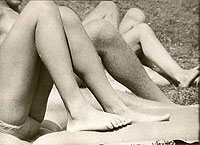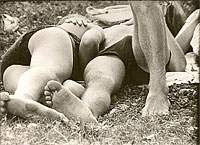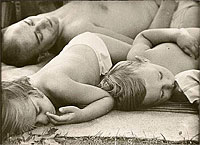 Strand
Strand
Hungary, 1963, black and white, 14 mins
Not so much a documentary as an often near-abstract study of bodies on beaches, much of István Ventilla’s film uses extreme telephoto foreshortening to reduce people to constituent parts. Flesh is contrasted with sand, stone and grass, and with other examples: hairy and smooth legs almost seem to be parts of different species. Fingers hold pieces of bread and watermelon, sweat beads form on a man’s face, deliciously plump sleeping children are contrasted with the wrinkled, leathery skin of people at the other end of Dante’s cammin di nostra vita.
 Slow dissolves and extreme close-ups heighten the sense of intimacy as we eavesdrop on conversations (or try to, though the camera is usually trained on the auditor rather than the speaker) or watch a couple lying together on the beach in a shot that could almost be a still photograph were it not for the almost imperceptible movement of a single caressing hand. There is no spoken content: the music segues from a stately choral affair to sparse woodwind, organ and solo female vocal. A bell is rung, heralding a change of pace. Crowds of people mass in a large swimming pool complete with wave machine, their movement heightened by the use of repeated panning shots, or zooms in and out. Whereas the film previously focused on one or two people at a time, here any sense of individuality is subsumed by becoming a tiny part of a gigantic mass movement of bodies, the effect heightened by the resumption of the earlier choral music and repeated camera pullbacks.
Slow dissolves and extreme close-ups heighten the sense of intimacy as we eavesdrop on conversations (or try to, though the camera is usually trained on the auditor rather than the speaker) or watch a couple lying together on the beach in a shot that could almost be a still photograph were it not for the almost imperceptible movement of a single caressing hand. There is no spoken content: the music segues from a stately choral affair to sparse woodwind, organ and solo female vocal. A bell is rung, heralding a change of pace. Crowds of people mass in a large swimming pool complete with wave machine, their movement heightened by the use of repeated panning shots, or zooms in and out. Whereas the film previously focused on one or two people at a time, here any sense of individuality is subsumed by becoming a tiny part of a gigantic mass movement of bodies, the effect heightened by the resumption of the earlier choral music and repeated camera pullbacks.
 Despite the evident talent displayed in this short, director/cinematographer István Ventilla’s career doesn’t seem to have amounted to much: his best-known film seems to be a 1978 US-made effort known variously as Nicole, Crazed or A Woman’s Revenge (1978), which an IMDB commenter characterised as “A very odd film with lots of fast editing shifts and loaded with non-sequiturs” and which is mainly notable for what is apparently the only nude scene featuring Catherine Bach of The Dukes of Hazzard. One assumes this wasn’t treated quite as elegantly and respectfully as the many bodies in Ventilla’s earlier film.
Despite the evident talent displayed in this short, director/cinematographer István Ventilla’s career doesn’t seem to have amounted to much: his best-known film seems to be a 1978 US-made effort known variously as Nicole, Crazed or A Woman’s Revenge (1978), which an IMDB commenter characterised as “A very odd film with lots of fast editing shifts and loaded with non-sequiturs” and which is mainly notable for what is apparently the only nude scene featuring Catherine Bach of The Dukes of Hazzard. One assumes this wasn’t treated quite as elegantly and respectfully as the many bodies in Ventilla’s earlier film.
- Director: István Ventilla
- Photography: István Ventilla
- Producer: József Pásztor
- Production Company: Béla Balázs Studio
Links
- The Béla Balázs Studio website entry includes credits and stills, but sadly no video.
- Internet Movie Database